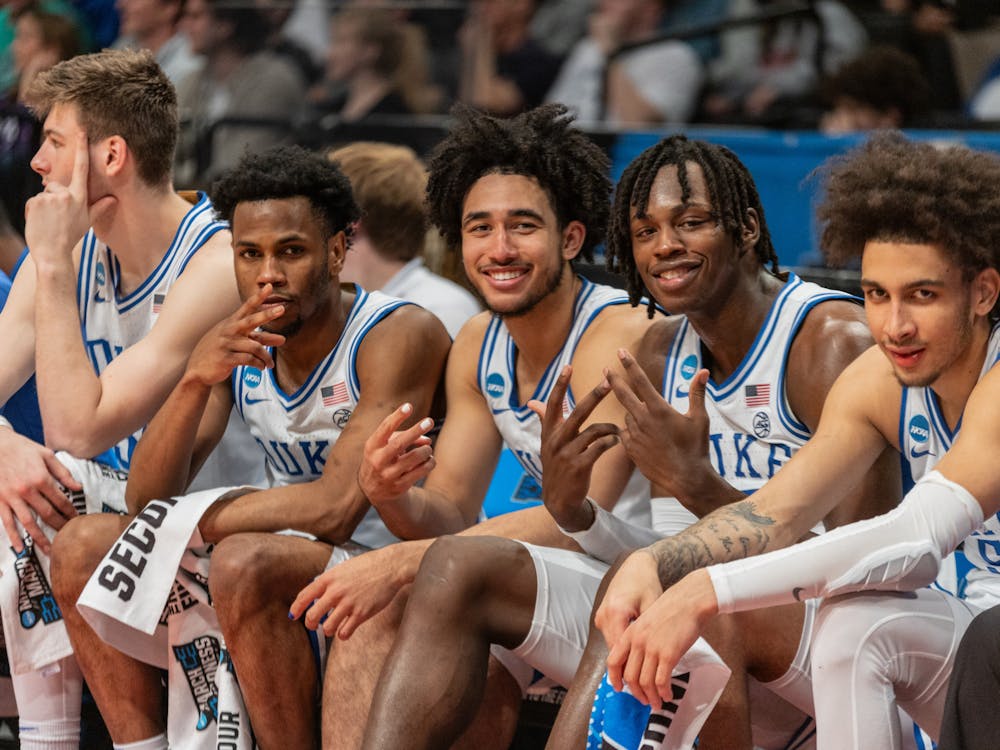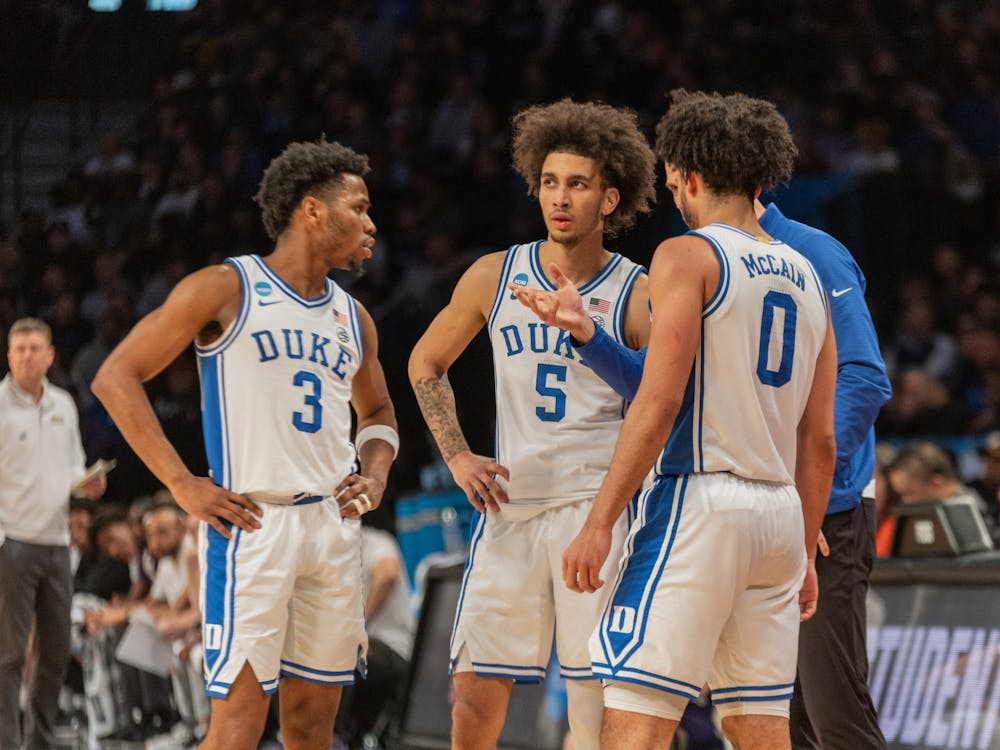BROOKLYN, N.Y.—In the Barclays Center locker room, while student managers packed bags and media teams shouted over one another, Jeremy Roach and Tyrese Proctor were laughing at a joke nobody else in the room was getting. Cackling, they both fell into their chairs and tried to regain seriousness for the cameras.
To Proctor’s left, TJ Power and Sean Stewart had their heads together. Neal Begovich, in the middle of the room, spoke quietly to an assistant coach the same way Power talked to Stewart.
I have almost never asked a Duke men’s basketball player about one of his teammates and gotten an answer in which his real name is used. Roach is “Jerm,” Proctor is “Rese,” Jaylen Blakes is “JBoog.” I have also never asked a player about a teammate and not been given an answer.
“I’ve got to know what Jerm’s saying and thinking,” Proctor said, talking about their on-court communication.
To be a Duke basketball player is to know how the guy next to you on the bench ticks. It is to know the strengths and weaknesses of 14 other young men as if they were brothers. “The Brotherhood” is not just a university marketing scheme — it’s an essential truth about this group. The best evidence for this is not found in locker room dynamics or in snippets of overheard dialogue. It’s on the court. When Duke plays a dominant game like the one it played Sunday night against James Madison, communication is as visible as every one of Jared McCain’s treys.
“Fifteen!” yelled Scheyer from the sideline. “Fifteen!” shouted Ryan Young from his spot at the post. The call echoed between players, from Young to Roach to Proctor until all five of them knew what to do to make another play on James Madison’s basket. It worked. Duke beat the Dukes by 38 points in the Round of 32, a far larger margin than most basketball fans — even the truly Blue Devil faithful — had expected.
They watched a lot of film. Coaches did a lot of preparation. They locked down the fundamentals before the game. But the Blue Devils won so well because they talked to each other.

It’s hard, according to senior point guard Spencer Hubbard, to hear things on the court. It’s hard to hear teammates but it is much harder to hear Scheyer on the sideline, which is why Duke players echo play calls so many times. Sometimes, it’s almost entirely up to the team leaders — not the coaches — to make decisions.
“Me and Tyrese, we’re an extension of the coach,” Roach said.
“He’s Jerm. He’s captain,” McCain said. “He's the guy that leads us. I look to him for so many things.”
Without this communication, buckets don’t happen. In the Barclays Center, McCain tied his previous record of eight triples — the most ever by a Duke player in a NCAA tournament game, by the way — to knock down a total of 30 points. Seven of his eight treys were assisted, three by Proctor. The Australian point guard knows to look for the rookie with the crazy arm. McCain knows how to ask for the ball.
Subtract all of McCain’s points from the scoresheet, and Duke still wins the game. The Blue Devils played an extremely well-rounded 40 minutes, one where every name on the roster took the opportunity to contribute. They could have relied on their rookie star to carry them to a win. They didn’t. Roach had 15 points. Proctor had 18. Kyle Filipowski had 14. In fact, every single member of the team, including the bench, with the sole exception of Begovich, put a point on the Barclays Center scoreboard.
“We huddle after every dead ball,” Roach said. “Constant communication. If we’re not talking out there, everybody’s gonna be going in different directions.”
It was clear they were talking because they were all going in the same direction the entire game. That’s how the Blue Devils forced 14 turnovers, got 25 defensive rebounds and used them to put up 21 second-chance points. They passed like crazy, because they knew where their teammates were going to be. They had 22 assists; they average 15.5. They only gave up six turnovers, even though the Dukes force an average of 14.4. Duke stole the ball from James Madison 12 times, thanks to a defense that ran not like a machine, but like a team ready to adapt to whatever it might get.
“It’s March,” Roach said. “Everybody’s not going to run the same things they ran in the season. We’ve got to be ready … that’s where communication comes in.”
With 3:32 on the clock, Scheyer benched the starting five and sent Hubbard onto the court to run point. The Duke section erupted, as did the team bench. The Blue Devils had one last thing to communicate: Let Hubbard shoot. The Los Angeles native walked from a practice player role to a roster spot going into his sophomore year, and has never seen minutes in a March Madness game. As the clock wound down and the Dukes tried half-heartedly to keep up a fight, the Blue Devils and their fans screamed “give it to Spencer!”
The message came through, like it had all night. Hubbard took a shot, drew a foul, and made his second free-throw. It was the last basket of the game.
The Blue Devils will hope they can keep the conversation going next weekend in Dallas, where they’ll meet with No. 1-seed Houston in the Sweet 16.
Get The Chronicle straight to your inbox
Sign up for our weekly newsletter. Cancel at any time.

Sophie Levenson is a Trinity junior and a sports managing editor of The Chronicle's 120th volume.

